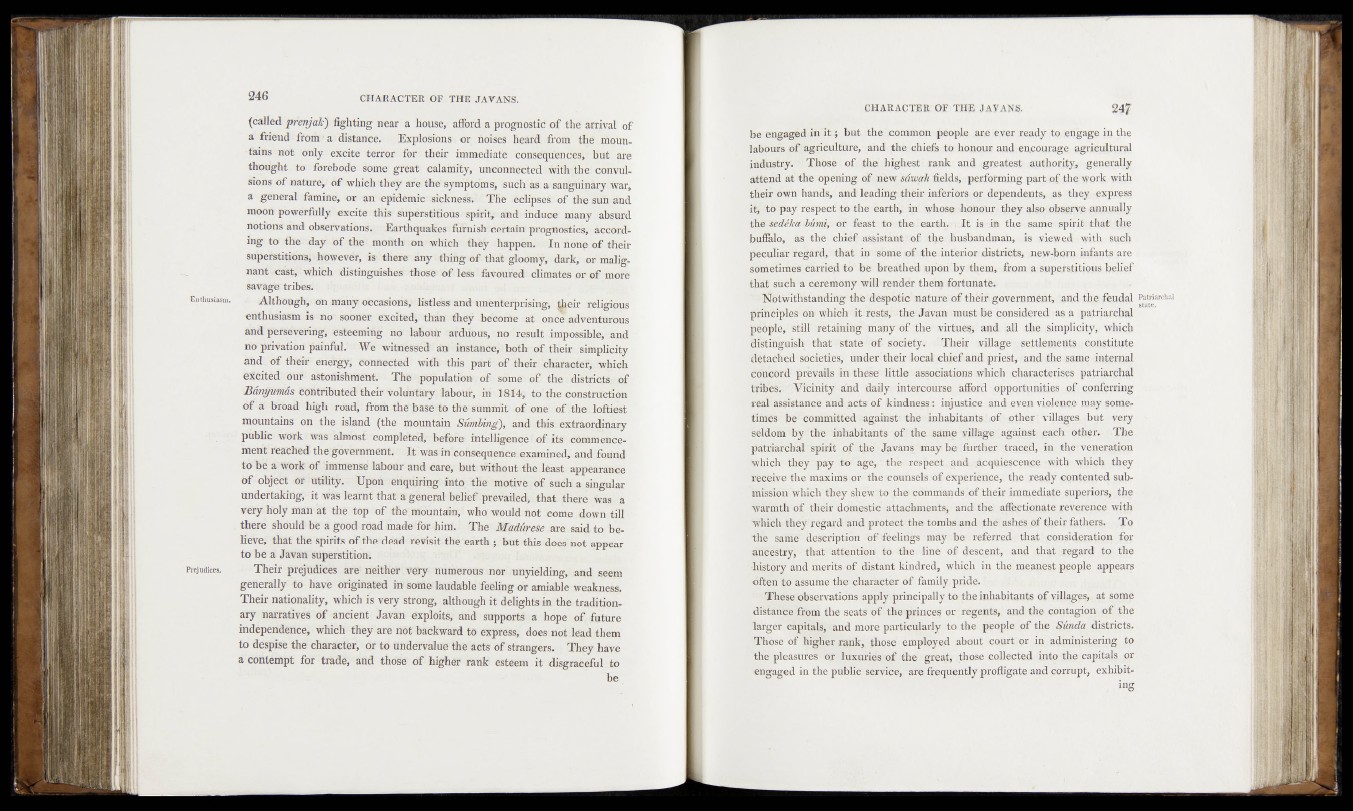
(called prenjak) fighting near a house, afford a prognostic of the arrival? of
a friend from -' a . distance. Explosions , or fioiseS heard from the moun-
tains not O'nly'nlxieite terror- For their immediate. ’eonsë|u!encesi but are
thought, to forèbode some great; calamity, unconnected Withfhe: convulsions
of nature, óf which they* are the symptoms; such as a sanguinary war,
a general famine, or an epidemic: sfcknesk The eclipses of the sun and
moon powerfully excite this sbpèrstóiious spirit^ afedi induce niany absurd
notions and> observations. Earthquakes' fdrnish certain1 p-rngnngftjps, according
to' the day of the- morith on which fhey happen. In nónp of their
snpertó^ónBi-hówevër, i s - a n y - t h i n g ofdhat gloomy,1 dark, orma%-
nant ;Cast,'. which distinguishes* tbosè" óf less favoured- climates or of: moré
savage'tribes, j
• AlthoüghV ón toany occasiöhs,1ifetleSs and1.im'ënterprisxng, tijeir religious
enthusiasm is »or sobnèr excited, than ihdy .become at' onbé.adventÉrous
a®& pefSMvertng; esteeming no labour arduous, np iresult impossible, nnd
no privation painful. We witnessed an instance;.both of their simplicity
and of their energy, connected with, this part of their. Character,’ .which
excitéd Our - astonishment. The 'population' o f1 some, of the districts;; of
Banyumds contributed’ their voluntary labour, in 181'4v to* the construction
of a broad high fo?Cd, from thé base to the summit of one of the loftiest
mountains on the island (the mountain Swnbing), and this extraordinary
public Work; Was. almost completed, before1 intelligencef of its! commencement
reachedth#gjóvêmméfft." It'was in?cohseqaericfi.exainmed, andifcyliii
to be a work- of immense labour and care, but without the deastrappèarance
of object or' utility. Upon enquiring into tKe- motive of sudh a singular
undertaking; it wa's’temrii; that'a-general'belief prevailed, that there was a
very holy man at the top of the mountain, who; would not -come, down, till
there Should be a good röad made for him. The Mudtirese are said to be*-
Keve; that the spirits of the'dead revisit the'earth but this does: not appear
to be a Javan superstition-.
Their prejudices are! tfeithe* .véTy- numerous nor-unyielding* and seem
generally to have originated in1 sofcie* laudable feeling or amiable weakness.
Their nationality, which is very strong, although it delights in the traditionary
narratives of ancient Javan exploits, and supports a hope of. future
independence, which they are not backward to express, does not lead them
to despise the character, or to undervalue the acts of strangers. They have
a contempt for trade, and those of higher rank esteem it disgraceful to
be
be engaged in itjj bat the Uommon people arp ey.er ready -to .engage iq the
labours of‘agriculture, and the chiefs to honour and encourage agricultural
industry.-' Thosè. of the highest1 rank and ‘greatest ^pftprfe* generally
attend at the opening, of nèw &mpè fields, : performing part,of the wprk with
their own hands, and leading their inferiors or dependents, as theyr express
it, to pay; respect to the earthy ip whose -honour they also obs&fvp annually
thé sèdékà ’-bûm£, or feast to th e . earth. . It is in the same- spirit that the
buffalo, as the chief assistant ’of: the husbandman, is viewed with such
peculiar regard, that in’ some of the.interior,districts, neWrb.orn iqfaqts are
sometimes carried -to be breathed upon by ;them, from a.supcj-stitiqus belief
that süch a cpremoily wilbqmddr thenj fortunate.
^Notwithstanding 'the despotic-nature of their, government, and the feudal Patriarchal
ptinbiples on which f-it restS'jcthé-Jsivan must be considered?'as a patriarchal
P'êôplé,tJstill: retaining -mapy.'Of "fhe virtue^, and all the ,§implioity, which
dis^tih^uishi-'- that state of society.1 Their .village settlements : cpnstitqtp
ffétached societies, under their local chief and priest, and the same internal
concord- prevails in these" little, associations which, .characterises patriarchal
tribes'.1.'Vicinity and daily; intercourse afford opportunities pf conferring
reab'aSsi-Stance and .qcts of kindness,: injustice andeve® vi#ie®iO may some?-
tirrie’s be committed-against 'the inhabitants hof .-pthegT villages, ■bqJ.jyery -
Mdom ;by -the inhabitants pf the. same village ' against .each other. ■ The
patriarchal spirit of the Javans may. hè*;further traced, ipjthe? veneration
^lîîëîï«-feèÿîpây to' age,- the respect and -.acquiescence -with which they
rêcèivë’fhe maxims or the counsels of. experience, the .ready contented submission
which Jthéy shew to ’.the commands of’their immediate superiors,. th§
warmth 'd£ tbfeif 'do'mestiè attachments, and> the, affectionate ^eyerpnee, with
Which-théy regard and protect'the tombs and thêashe&of their fathers. To
the saffie,r’deèèrîptiôn Mofiffiêlid^s may be ireferred that consideration for
anééstfy; ' that attention- to the- line of descent, and th^t-regard to the
•history and merits of distant kindred, which in the meanest people appears
oftèn tb assume the character of family pride. V.
| These observations -apply principally to the inhabitants of villages,, at some
diséànbeifrom the seats of - thëtprinces? or" regents,.' and the contagion of the
.iargér capitals, fand mote particularly to the people qf the S,ûydci districts.
'Those of higher rank,, those employed ahobt'court:or in administering tp
the pleasures -'oj luxuriesmf th eg re a t, those .collected/an to the capitals pi
Engaged in the public service, are frequently profligate and corrupt, exhibif-
. i“g